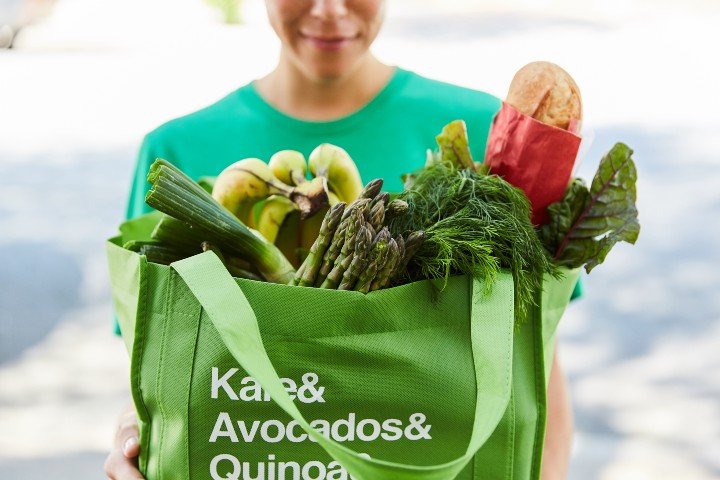The global food and grocery retail market was worth almost $11.3 trillion in 2021, and it’s likely to grow right along with the population in coming years. The industry is a huge pie with a lot of slices. There are plenty of companies competing for consumers’ food dollars.

1. General Mills
Packaged food giant General Mills (GIS 1.69%) owns a wide variety of well-known brands. The company’s brand portfolio includes Pillsbury, Cheerios, Häagen-Dazs, Progresso, Green Giant, Yoplait, and many others.
The COVID-19 pandemic benefited General Mills as consumers increased their consumption of food at home due to restrictions on restaurant dining. The company's core North America retail segment, driven by strength in organic products, meals, and baking, performed well throughout the pandemic.
Elevated inflation and economic uncertainty are likely to change consumer behavior, but General Mills has many brands that people are willing to pay for. So far, the company has had no trouble passing on higher prices to consumers. In the third quarter of fiscal 2023, higher prices contributed 16 percentage points to revenue growth, while volumes remained flat despite those higher prices.
General Mills’ pet segment, the result of the 2018 acquisition of Blue Buffalo, is particularly well positioned. Pet ownership boomed during the pandemic, and sales of premium pet foods have been on the rise for years. With pets increasingly viewed as part of the family, pet owners may be reluctant to trade down to cheaper pet food options.
General Mills stock has soared over the past couple of years, but it remains reasonably priced. The stock trades for around 21 times forward earnings, and it sports a dividend yield of roughly 2.5%. There’s plenty of economic uncertainty right now, but General Mills’ pricing power should help see it through.
2. Tyson Foods
Meat products will likely continue to be a staple of U.S. diets. If you’re looking to invest in the meat industry, Tyson Foods (TSN 0.59%) is a reasonable choice, especially if you want to bet on the continued consumption of meat.
Tyson certainly doesn’t have the pricing power of a packaged food company with well-known brands, given that meat is largely a commodity. Meat processing in the U.S. is highly concentrated among a small number of companies such as Tyson, which own a relatively small number of massive facilities. The company’s results are partly dictated by supply and demand for beef, pork, and chicken, with margins heavily influenced by pricing.
The meat industry has recovered from the challenges of plant shutdowns and COVID-19 outbreaks early in the pandemic. While inflation may lead consumers to choose cheaper cuts or reduce meat consumption, pricing and volumes are still on the rise. In the first quarter of 2023, Tyson reported 0.8% growth in volume and 1.7% growth in average pricing.
Tyson's profits are starting to take a hit due to cost inflation and other factors, but bottom-line fluctuations are an inevitable part of this industry. Operating income plunged in the first quarter, with the beef and pork segments hit particularly hard. Going forward, margins are likely to remain below pandemic-level highs.
Tyson sees revenue between $55 billion and $57 billion in fiscal 2023. The average analyst estimate calls for full-year earnings per share of $4.30, putting the price-to-earnings ratio at about 14. Tyson profitability will suffer as industry trends normalize in the post-pandemic period, but the company remains a leader in the meat industry.
Best food stocks to buy in 2024
The best food companies have strong brands that compel consumers to pay up for their products, and they also enjoy economies of scale that keep costs low. Pricing power and cost advantages are particularly important now, with inflation squeezing budgets and supply chain costs rising.
While there are many food stocks to choose from, not all of them belong in your portfolio. Here are a few that stand out as the best food stocks:
3. Mondelez International
Like General Mills, Mondelez International (MDLZ -1.23%) boasts a long list of well-known brands. These include Cadbury, Chips Ahoy!, Oreo, Philadelphia, Ritz, Wheat Thins, and many others. The company’s focus is on snack brands, and it sells products in more than 150 countries.
Mondelez expanded organic sales by 12.3% in 2022, driven by 2.7% volume growth and a 9.6% rise in average pricing. Having a stable of iconic brands that consumers are unlikely to abandon sets up Mondelez well for an inflationary environment.
Mondelez sees organic sales growing by 5% to 7% this year, and free cash flow should be at least $3.3 billion, up about 10% from 2022. The company expects to use this cash flow for roughly $2 billion of share repurchases this year on top of its quarterly dividend.
Mondelez trades for around 23 times forward earnings, a bit pricier than General MIlls. But Mondelez’s geographic diversification and its strong slate of brands are attractive assets as economic uncertainty grows.
4. PepsiCo
PepsiCo (PEP -0.68%) is another packaged food company with a large portfolio of leading brands. On the beverage side of the business, Pepsi, Mountain Dew, and Gatorade top the list. On the food side, Lay’s, Doritos, Quaker Oats, and Cheetos are just a few examples from the company’s portfolio.
PepsiCo’s first-quarter results put the company’s pricing power on display. Organic revenue soared, thanks to a 16% increase in effective net pricing which more than offset a 2% decline in volumes. Like Mondelez, consumers are largely accepting higher prices for PepsiCo’s products.
PepsiCo expects organic revenue and adjusted earnings per share to rise by 8% and 9%, respectively, this year. In other words, the company anticipates being able to pass off rising costs to its customers in the form of higher prices. There’s a limit to PepsiCo’s pricing power, but the company hasn’t really found it yet.
PepsiCo trades for around 26 times forward earnings, which is not exactly cheap. But the quality of the company’s brands certainly justifies a premium valuation.
Food industry sectors to watch
While General Mills, Tyson Foods, Mondelez International, and PepsiCo are great overall picks in the food industry, companies in more specialized sectors are worth a look as well. Here are a few categories to consider.
Plant-based food stocks
U.S. consumers already derive the majority of their calories from plant-based sources, and the companies above offer plenty of plant-based options. A big trend in recent years has been plant-based foods made to look and taste like meat and other animal-based foods.
Beyond Meat (BYND -2.26%) is a pure-play plant-based food stock, offering a variety of products built around pea protein. The company has run into some late pandemic headwinds, not to mention an onslaught of competitors. Revenue declined by 9.8% in 2022, and rising costs led to a massive net loss. Cost inflation and pricing pressure has led Beyond Meat's gross margin to turn negative, a sign that the company has no real pricing power.
The stock has taken a huge hit, but Beyond Meat is a stock to consider if you believe in the long-term potential of plant-based protein. It's going to be a very rough road that may not end well, so investors need to carefully weigh the risks.
Related investing topics
Grocery store stocks
For the most part, grocery stores have a limited ability to pass off higher costs to consumers. Inflation may put some pressure on grocery industry profits, but that’s not a reason to avoid the industry entirely.
One interesting grocery store stock is Sprouts Farmers Market (NYSE:SFM). Sprouts is a small chain with a few hundred stores and is heavily focused on specialty products. The company derives around two-thirds of its sales from “attribute-based” products -- with examples of those attributes including organic, paleo, keto, and plant-based. This differentiation from legacy grocery stores, combined with the potential to greatly expand its store network, makes Sprouts a food stock worth watching.















